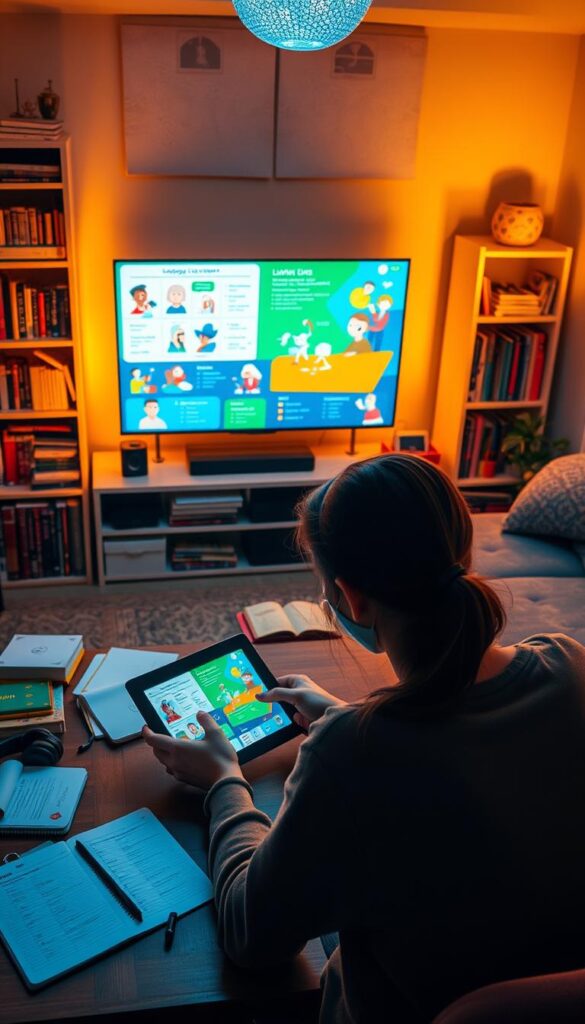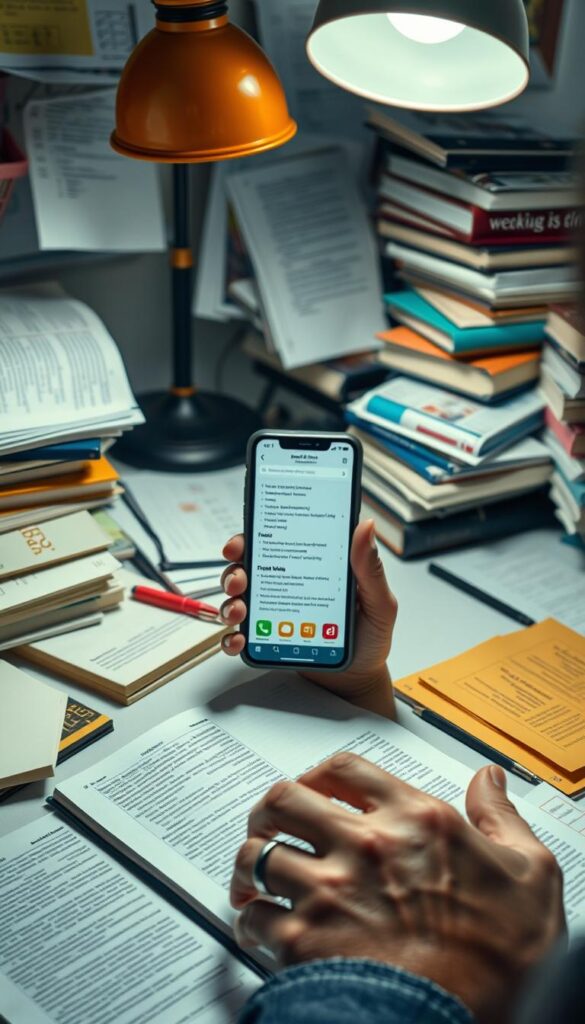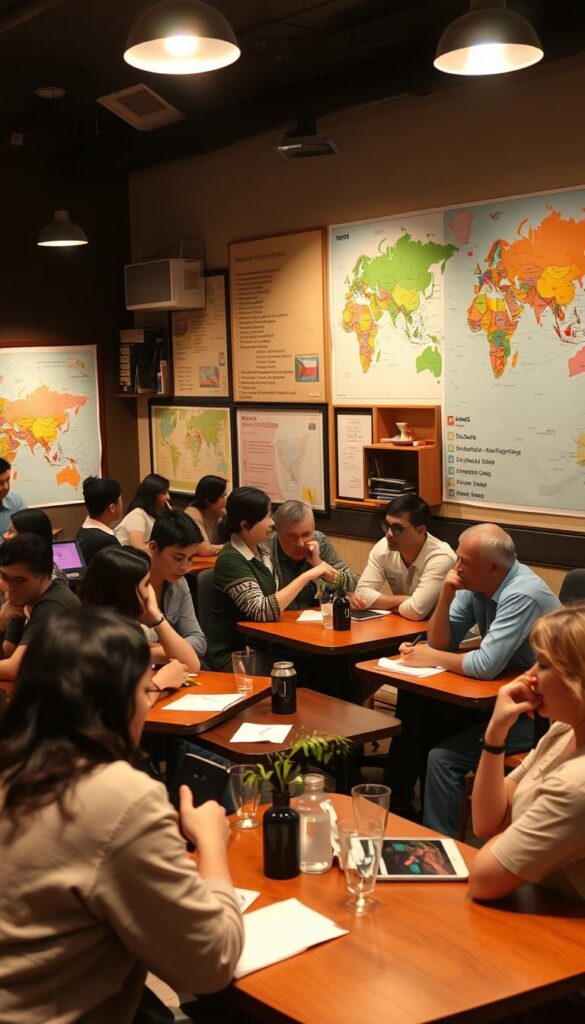Improve Your Language Skills: Tips & Strategies
In today’s world, knowing a foreign language can change your life. Czech Universities say, “Knowing a foreign language opens a new world.” Many people have found this to be true.
Want to get ahead in your career, improve your education, or connect with others? Improving your language skills can make a big difference.
Learning a new language can open doors to new experiences. In this article, we’ll share tips and strategies for language learning.
Key Takeaways
- Discover the benefits of being proficient in a foreign language
- Learn effective strategies for improving your language abilities
- Explore the impact of language skills on education and career prospects
- Understand the importance of language proficiency in personal relationships
- Find tips on how to stay motivated during the language learning process
Understanding the Importance of Language Skills
Language skills are key in today’s world. They help us communicate well and offer many benefits. As the world gets more connected, speaking multiple languages becomes more valuable.
Why Language Skills Matter
Language skills are crucial for talking well in both personal and work life. Improving your language skills helps you connect with people from different places. This builds stronger relationships and a deeper understanding of various cultures.
Here are some reasons why language skills are important:
- They help us talk better with people from different language backgrounds.
- They open up more job opportunities in a global market.
- They let us better understand and appreciate different cultures.
Benefits Beyond Communication
Language skills do more than just help us talk. They also boost our brain power and personal growth. Learning a new language can make your brain work better, as an article on Czech Universities points out.
The advantages of learning languages include:
- They improve our thinking and memory.
- They help us do better in school and learn faster.
- They give us a chance to grow professionally and personally.
By improving our language skills, we can stand out in the job market. We also get to enjoy a richer life by understanding more cultures and communities.
Assessing Your Current Language Proficiency
To get better at a language, you need to know where you stand. It’s key to find out what you’re good at and what you need to work on. This helps you learn more effectively and improve your communication skills.

Self-Evaluation Techniques
Checking yourself is a great way to learn a language. It helps you see what you’re doing well and what you need to get better at. Start by keeping a language diary. Write down your experiences and think about what’s hard for you.
Try self-testing too. See how well you know grammar, vocabulary, and can talk in the language. Use online quizzes, apps, or record yourself speaking and listen back.
Seeking Professional Assessments
But, getting a professional’s opinion is also important. Language proficiency tests like TOEFL or IELTS give you a score that’s recognized worldwide.
Also, working with a language tutor or taking a course can help. They give you feedback on your skills. They can tell you where you’re struggling and how to get better.
Setting Realistic Language Learning Goals
The journey to language proficiency starts with setting clear, achievable goals. To advance language fluency, learners must first understand the importance of goal-setting in their language acquisition journey.
Short-Term vs. Long-Term Goals
When it comes to language acquisition strategies, it’s important to know the difference between short-term and long-term goals. Short-term goals give you immediate motivation and a sense of accomplishment. Long-term goals give direction and purpose to your learning.
- Short-term goals might include completing a language course module or practicing conversation for 30 minutes daily.
- Long-term goals could involve achieving fluency in a language within a year or being able to read literature in the target language.
SMART Goal Framework
To make sure your language learning goals are effective, use the SMART goal framework. SMART stands for Specific, Measurable, Achievable, Relevant, and Time-bound.

- Specific: Define what you want to achieve, such as improving speaking skills.
- Measurable: Quantify your goal, for example, holding a 30-minute conversation without assistance.
- Achievable: Ensure the goal is realistic based on your current level and resources.
- Relevant: Align your goal with your broader language learning objectives.
- Time-bound: Set a deadline for achieving your goal, such as within the next 6 months.
By using the SMART framework and balancing short-term and long-term goals, language learners can create a clear roadmap. This enhances their ability to advance language fluency effectively.
Effective Resources to Enhance Language Skills
Learning a new language is easier with the right tools. This includes online courses and books. To master language techniques, it’s key to use many different learning materials.
Online Courses and Apps
Online courses and apps have changed how we learn languages. Sites like Duolingo, Babbel, and Rosetta Stone offer fun, interactive lessons. They fit different learning styles.
- Duolingo: Known for its gamification approach, making language learning engaging and fun.
- Babbel: Focuses on conversational skills, with a comprehensive curriculum.
- Rosetta Stone: Utilizes immersive techniques to teach languages through images and audio.

Language Learning Books and Guides
Books and guides are still great for learning languages. They give detailed explanations of grammar and vocabulary.
| Resource Type | Description | Benefit |
|---|---|---|
| Language Textbooks | Comprehensive coverage of grammar and vocabulary. | Structured learning approach. |
| Language Phrasebooks | Practical phrases for real-life situations. | Useful for travelers. |
| Language Learning Guides | Tips and strategies for effective learning. | Enhances learning efficiency. |
Using online courses, apps, and books together makes a great study plan. It meets your specific learning needs.
Incorporating Language Practice into Daily Life
Making language learning a part of your daily routine can really boost your linguistic abilities. It’s all about being consistent. Doing it every day can make a big difference over time.

Practical Exercises at Home
There are many ways to improve your language skills at home. One great idea is to talk to yourself in the language you’re learning. Experts say this helps you get used to how the language sounds and feels.
Other fun activities include:
- Labeling things around the house with their names in the target language.
- Keeping a language diary to practice writing.
- Listening to music or podcasts in the target language while doing chores.
Language Exchange with Native Speakers
Talking with native speakers is another great way to get better at a language. It lets you practice speaking and learn about the culture too.
You can find native speakers to talk with through:
- Local language meetups.
- Online language exchange platforms.
- Social media groups for language learners.
By adding these activities to your daily routine, you can really improve your language skills. And boost your linguistic abilities too.
Engaging with Multimedia Language Content
In today’s world, using multimedia content is a great way to get better at languages. Things like movies, music, podcasts, and audiobooks are full of learning materials. They fit different learning styles and tastes.
Leveraging Movies and Music
Watching movies in the target language is a fun way to boost listening and understanding. It introduces learners to different accents, phrases, and cultures. Start with movies that have subtitles in the target language or your native language to get the most out of it. Music also helps; listening to songs in the target language gets learners used to the language’s rhythm and tone.

Using Podcasts and Audiobooks
Podcasts and audiobooks are great for language learners. They help improve listening skills and learn new words in context. Choose topics that interest you, making learning fun and enjoyable. Podcasts offer a wide range of topics and styles, from educational to entertaining, helping learners find what fits their interests and skill level.
To make the most of these tools, learners should repeat and review the content. This means replaying a podcast or rewinding a movie scene to understand a phrase better. Also, learners can transcribe parts of the content to improve writing skills and remember new vocabulary.
Overcoming Challenges in Language Learning
Every learner of a new language faces hurdles. But, it’s how you tackle these obstacles that shapes your success. Learning a language is a journey that needs persistence, smart strategies, and a positive attitude.

Common Obstructions and Solutions
One big challenge is the fear of making mistakes. This fear can stop you from practicing and getting better. To beat this, it’s key to create a safe space to practice without fear of being judged. Programs for language exchange or speaking with a tutor can offer this safe place.
Keeping up a regular study routine is another hurdle. To solve this, set achievable goals and plan a study schedule that suits your life. Adding language learning to your daily life, like listening to music or podcasts in the target language, can also keep you consistent.
Staying Motivated and Consistent
Keeping motivated is vital for improving your language skills. A great way to stay motivated is by celebrating small wins. Recognizing achievements, like understanding a conversation or reading a sign, boosts your spirits and keeps you going.
Also, being surrounded by the language can make learning more fun. This can be done by watching movies, listening to music, and engaging with media in the target language. These activities not only make learning enjoyable but also expose you to various language uses.
By knowing the common challenges and finding ways to overcome them, you can greatly enhance your language learning journey. Staying motivated and consistent, with the right tools and mindset, will help you improve your language skills and become more fluent.
Joining Language Learning Communities
Joining a language learning community can really help you improve. It’s great to meet others who want to learn the same language as you. This can make your learning journey much better.
Local Language Groups
Local language groups are perfect for meeting people face-to-face. They have meetups, language exchange events, and cultural activities. These help learners feel supported and learn more.
Benefits of Local Language Groups:
- Face-to-face interaction
- Cultural immersion
- Opportunities for spontaneous conversation practice
Online Forums and Social Media
If you like online learning, forums and social media groups are great. They let you connect with people all over the world. You can find lots of resources and join in on discussions.
Popular Online Platforms:
- Reddit forums dedicated to language learning
- Facebook groups for language learners
- Discord servers for language exchange
| Aspect | Local Language Groups | Online Language Communities |
|---|---|---|
| Interaction Type | Face-to-face | Virtual |
| Accessibility | Limited by location | Global |
| Flexibility | Scheduled meetups | 24/7 availability |

Being part of language learning communities, whether local or online, helps a lot. You can use language acquisition strategies and master language techniques better. The community feeling makes learning more fun and effective.
Tracking Progress and Celebrating Success
As you keep learning a new language, it’s key to track your progress and celebrate your wins. This keeps you motivated and interested, helping you reach your goals in language skills.
Reflecting on Your Journey
Keeping a language diary is a great way to see how you’re doing. By writing down your thoughts, experiences, and insights, you can see how far you’ve come. It also helps you grow and change your learning strategies as needed.
Acknowledging Achievements
It’s important to recognize your achievements. Whether it’s learning a new grammar rule, talking with a native speaker, or understanding a tough text, celebrating your wins boosts your motivation. It shows you that all your hard work is paying off.
FAQ
What are the benefits of improving my language skills?
Better language skills can open up more opportunities. They help you communicate better and understand more. This can lead to personal and professional growth.
How can I assess my current language proficiency?
You can test yourself or get a professional assessment. Language tests and expert opinions can show your level and what you need to work on.
What is the SMART goal framework, and how can it help me?
SMART stands for Specific, Measurable, Achievable, Relevant, and Time-bound. It helps you set clear goals. This keeps you focused and motivated in your language learning journey.
What are some effective resources for language learning?
Online courses, apps like Duolingo, and books like “Language Hacking” by Benny Lewis are great. They help improve your skills and keep you excited about learning.
How can I incorporate language practice into my daily routine?
Practice at home, talk to native speakers, and listen to podcasts and audiobooks. These activities make learning a part of your daily life.
What are some common challenges in language learning, and how can I overcome them?
Staying motivated and consistent can be tough. Set realistic goals, find a community, and track your progress. This helps you stay on track.
How can joining a language learning community help me?
Language communities offer support and motivation. They also give you chances to practice with others. This boosts your skills and confidence.
Why is it essential to track my progress and celebrate my success?
Tracking and celebrating your achievements keeps you motivated. It shows your hard work and helps you grow. This leads to better language skills.
What are some strategies for staying motivated in language learning?
Set goals, join a community, and use different learning resources. This makes learning fun and keeps you interested.
How can I master language techniques and improve my language skills?
Practice regularly and use various resources. Expose yourself to different situations. This sharpens your skills and makes you more confident.
The post Improve Your Language Skills: Tips & Strategies first appeared on ItsAndroidzilla.
source https://itsandroidzilla.com/android/improve-your-language-skills-tips-strategies/
Comments
Post a Comment